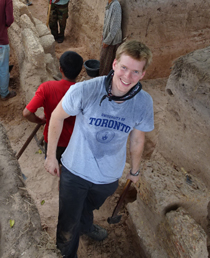The Introduction of Theravada Buddhism to Angkor, Cambodia (c. 13th-16th Centuries) – Mapping and Interpreting Religious Change Through the Archaeological Record
The Introduction of Theravada Buddhism to Angkor, Cambodia (c. 13th-16th Centuries) – Mapping and Interpreting Religious Change Through the Archaeological Record
Andrew Harris, Research Associate, University of Toronto’s Archaeology Centre (ACUT)
How do we identify religious transition and social change in the archaeological record? How does an entire society seamlessly, or not so seamlessly, adopt an entirely new worldview? Is it gradual, or immediate, and what are the consequences? And of earlier traditions, what remains, what is neglected, and how do those in the present materially engage with their past to create their vision of the future?
This talk will explore the cosmological re-envisioning of the medieval Cambodian capital of Angkor through the society-wide adoption and dissemination of Theravada Buddhism, the focus of my doctoral Dissertation, beginning in the 13th century CE. This process is marked primarily through the construction of wooden prayer halls/vihara, known locally as prah vihar, which supplanted the longstanding tradition of stone Hindu and Mahayana Buddhist (Brahmano-Buddhist) temple-construction within Angkor yet similarly served as microcosms of politico-religious authority and hubs of social and economic organization. Additionally, defunct Brahmano-Buddhist temples feature ample evidence for monastic construction and structural conversion rather than demolition, highlighting their significance as revered monuments which defined the landscape irrespective of religious denomination. The relative absence of historico-religious inscriptions associated with prah vihar construction and temple conversion, key to previous interpretations of Angkorian history, emphasizes the importance of the archaeological record in understanding the dynamics of this unique historical phenomenon. I will present and evaluate spatial, architectural, artifactual, and radiometric evidence to provide a formative model of religious transition at Angkor, highlighting activity in the 3x3km walled citadel of Angkor Thom where upwards of seventy prah vihar have been identified. I will also explore ideas of social memory as ingrained in the localization of religious place-making, and emphasize the significance of this case study to further understanding cultural shifts and the exchange of ideas across the ancient world.
 Andrew Harris earned his PhD in Anthropology (subfield Archaeology) at the University of Toronto (2021), and currently serves as the Director of the Angkor Vihara Project, a collaboration between Cambodia’s APSARA National Authority and ACUT dedicated to the research, excavation, and publication of early Theravada Buddhist archaeology at Angkor, Cambodia. His doctoral research explored the effects of religious change and transition on socio-political organization and construction trends across the ancient world, focusing on the material-religious shift from Hindu temple construction to Theravada Buddhist monasticism at Angkor during the 13th-15th centuries as reflected by an undocumented construction “boom” of prayer-halls within the walled urban centre of Angkor Thom. Andrew specializes in the Buddhist archaeology of Cambodia, China, and Thailand, colonial-era historiography, GIS analysis, and the history of East and Southeast Asia. Andrew is a previous recipient of the Robert H. N. Ho Dissertation Fellowship in Buddhist Studies, and has published his work in World Archaeology and Medieval Worlds with upcoming publications in Artibus Asiae, Asian Archaeology, and the Brill Handbook in Memory Studies. He is currently working towards the preparation of a second season of archaeological excavation at Angkor Thom, comprising the large-scale excavation of two Theravada Buddhist prayer-halls alongside the first focused study of a Buddhist necropolis at Angkor, as well as the publication of his Dissertation as a manuscript.
Andrew Harris earned his PhD in Anthropology (subfield Archaeology) at the University of Toronto (2021), and currently serves as the Director of the Angkor Vihara Project, a collaboration between Cambodia’s APSARA National Authority and ACUT dedicated to the research, excavation, and publication of early Theravada Buddhist archaeology at Angkor, Cambodia. His doctoral research explored the effects of religious change and transition on socio-political organization and construction trends across the ancient world, focusing on the material-religious shift from Hindu temple construction to Theravada Buddhist monasticism at Angkor during the 13th-15th centuries as reflected by an undocumented construction “boom” of prayer-halls within the walled urban centre of Angkor Thom. Andrew specializes in the Buddhist archaeology of Cambodia, China, and Thailand, colonial-era historiography, GIS analysis, and the history of East and Southeast Asia. Andrew is a previous recipient of the Robert H. N. Ho Dissertation Fellowship in Buddhist Studies, and has published his work in World Archaeology and Medieval Worlds with upcoming publications in Artibus Asiae, Asian Archaeology, and the Brill Handbook in Memory Studies. He is currently working towards the preparation of a second season of archaeological excavation at Angkor Thom, comprising the large-scale excavation of two Theravada Buddhist prayer-halls alongside the first focused study of a Buddhist necropolis at Angkor, as well as the publication of his Dissertation as a manuscript.
| Wednesday, October 13, 2021 Hosted on Zoom |
See CSEAS Current Calendar of Events and Activities
